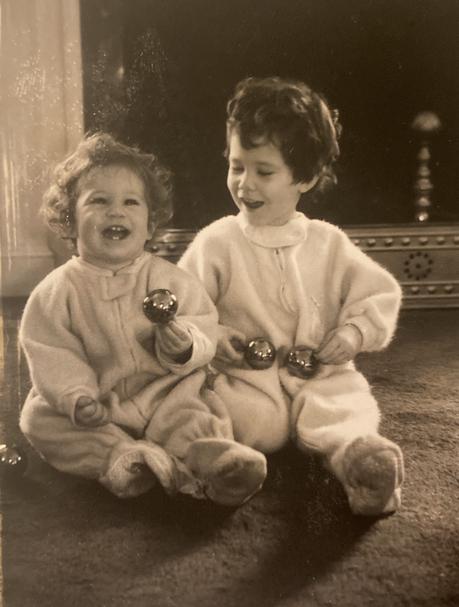 My little sister and I, in our interfaith family in 1964.
My little sister and I, in our interfaith family in 1964. We have reached (finally!) the last month of the longest year I can remember, 2020. And December means that many interfaith families are about to join in the dance of Hanukkah and Christmas, whether or not they feel like dancing. This year, the eight nights of Hanukkah start on December 10th, midway between Thanksgiving and Christmas. Personally, I prefer these years when Hanukkah begins and ends before Christmas, so that each holiday gets separate celebration, and there's even a moment to pause between them.
Whether you celebrate one of those holidays, or both, or neither, all of us need to cultivate empathy for our partners and family members in December, while honoring our own needs, and being mindful of how this season can trigger both joy and sadness, especially in a year of pandemic. We are also becoming more aware that "interfaith family" doesn't always mean Jewish and Christian. The fastest-growing "interfaith" demographic, according to Pew Research, is Christian and "religious none" (a catch-all for atheists, secular humanists, agnostics, the spiritual-but-not-religious, and others who couldn't find a better box to check). And an increasing number of interfaith families include members who are Hindu, Muslim, Buddhist, Pagan, celebrate indigenous religions, or reclaim African diasporic traditions including vodun, Santeria, or candomblé. Our interfaith families are becoming more richly complex.
Last year, I created a new resource, The Interfaith Family Journal, to help any and every family figure out how to honor diverse religious or spiritual or cultural roots, and formative childhood experiences, while claiming and creating a plan for December (and every other month) that works for your family. The Journal traces a five-week process of writing prompts, discussion topics, and creative activities. The result is a unique resource for therapists, clergy, and families. Here, I distill from the Journal eight ways to plan for a deeper, more mindful, and peaceful season:
1. REFLECT
Ask yourself about how you experienced December as a child. What did you celebrate? How did you feel about Christmas music, decorations, movies, in American popular culture? Were you aware of being part of the religious majority or minority? How have those feelings changed over time?
2. DISCERN
Ask yourself which of your childhood winter holiday rituals you want to continue in adulthood, or take on in the future? What traditions do you want to transmit to your children? Is this because they have religious meaning, spiritual meaning, and/or cultural meaning for you?
3. INQUIRE
Ask your partner(s) or other intimate family members or co-parents how they felt during December as children. Do you understand how your childhood experiences overlap, or diverge? What are the differences? What are the synergies?
4. EMPATHIZE
Ask your partner which public expressions of the season-in public town displays, on the radio, on TV-might make them feel joyful, nostalgic, sad, or alienated, this year. Do you understand why? How has this changed for them, over time? Note that secular or cultural does not necessarily mean less important than religious or spiritual!
5. SENSE
No matter what religious (or non-religious) affiliation(s) or identity you have chosen for your family or children, are there multi-sensory December experiences that you would like to retrieve, or pass down, or take on? Music? Recipes? Crafts? Is your partner okay with tasting, smelling, hearing these with you?
6. PLAN
The number of celebrations can feel overwhelming in December, especially for interfaith families. Make a plan! Which holidays this month will you spend with which extended family members (and when)? Which will you spend with friends? And which will you spend with just your partner(s) and/or kids? With the pandemic surging, balance celebrations you can do at home with zoom call celebrations with extended family. This is a good year to really focus on home-based traditions with your partner(s) and/or children! Make sure that your partner feels comfortable with the plan.
7. GIVE
Whether or not you celebrate Christmas or Hanukkah as a family, December can be an inspiring time to think about helping your community and to prepare for New Year's resolutions. Especially after the horrific 2020 we have all just experienced, community service can help to keep the midwinter blues at bay. Talk to your family members about starting a tradition of December giving, or December action, to help to heal your community or the world.
8. SNUGGLE
No matter which traditions you celebrate, the scientific reality is that this is the darkest and coldest time of year in the northern hemisphere. It is probably not a coincidence that near the midwinter solstice, we try to brighten our world with the Yule hearth, Christmas lights, Hanukkah and Kwanzaa candles, or firecrackers for the Chinese Lunar New Year. So be gentle with yourself, and with your family members, as we move through the darkest days of this most difficult of years, until we tilt again towards the sun.
Note: I wrote an earlier version of this piece last year for Psych Bytes, a publication that subsequently folded in the pandemic. Journalist is an interfaith families speaker, consultant, and coach, and author of Being Both: Embracing Two Religions in One Interfaith Family (2015), and The Interfaith Family Journal (2019). Follow her on Twitter @susankatzmiller.
